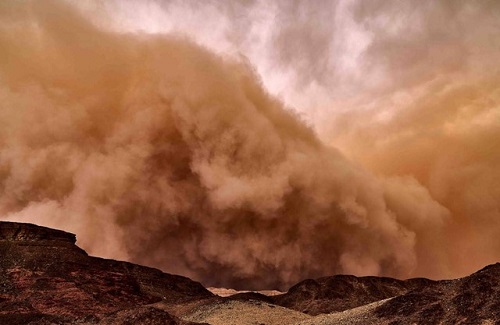FWP:
SETS == DEFINITION;
EK; IDIOMS
DESERT: {3,1}
To 'put/throw dust on one's head' [;xaak ;Daalnaa] is a customary expression of grief and mourning. In addition, to 'throw dust on' something also has two wonderfully apposite idiomatic meanings (see the definition above): 'to bury or conceal (something disgraceful)'; and 'to heap curses on, to execrate'. The wretched, isolated speaker might well wish to 'bury' his own disgrace and troubles in the dust, and/or to 'curse' his ill fortune.
The commentators also suggest that the verse evokes the idiomatic expression 'to fling up dust' [;xaak u;Raanaa], which means, most appropriately, 'to wander, roam' or 'to make a stir or commotion' (see the definition above).
The addressee (who may well be the speaker, counselling himself) is assaulted by a whole onrush of sorrows; in the second line we learn that his reaction should be 'one' handful of dust-- but what a handful! It may well be a particular, unique, even excellent one.
For the second line is devastating. What is to be thrown onto the head is one very specific 'handful' of dust. It is that particular one [vuh ek] that's such that they-- the unspecified 'they', meaning 'people in general'-- would call it a 'desert'. Meaning what exactly? As usual, we're allowed, and also required, to decide for ourselves. Here are some possibilities:
=The handful of dust would be vast, potent, and dusty enough to fool 'them' into thinking it's a desert, even though it's not.
=The handful of dust would be vast, potent, and dusty enough to actually become a desert, so that 'they' would be right to give it that name.
=That special handful of dust would be big enough to bury and finish off the lover, so that the place where he had been would now look like an uninterrupted stretch of desert.
=What the lover would pick up and throw would be what 'they' would call a desert; but to him it's so unimpressive that he considers it no more than a handful of dust.
My own favorite of the above readings is the final one. It reminds me of the puniness and vulnerability of the desert in {5,4}.
For another 'dust on the head' verse, see {172,5x}.

Nazm:
;Gariibii is in the sense of 'countrylessness' [be-va:tanii], and this suggests that this person is intending to be a wanderer in the desert and wilderness, and the pain of countrylessness is upon him, and after wandering about [;xaak u;Raanaa] he realizes extremely clearly that he considers the desert to be a single handful of dust. (258)
== Nazm page 258